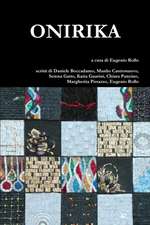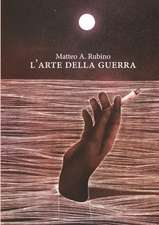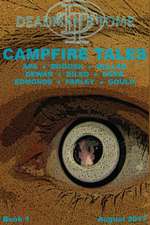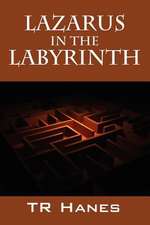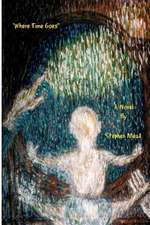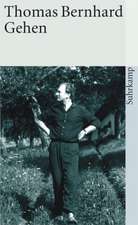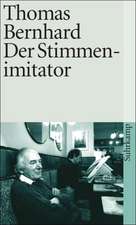The Lime Works
Autor Thomas Bernhard Traducere de Sophie Wilkinsen Limba Engleză Paperback – 28 feb 2010
Preț: 108.72 lei
Nou
Puncte Express: 163
Preț estimativ în valută:
20.80€ • 21.72$ • 17.22£
20.80€ • 21.72$ • 17.22£
Carte tipărită la comandă
Livrare economică 04-18 aprilie
Preluare comenzi: 021 569.72.76
Specificații
ISBN-13: 9781400077588
ISBN-10: 1400077583
Pagini: 241
Dimensiuni: 133 x 206 x 19 mm
Greutate: 0.28 kg
Editura: Vintage International
ISBN-10: 1400077583
Pagini: 241
Dimensiuni: 133 x 206 x 19 mm
Greutate: 0.28 kg
Editura: Vintage International
Extras
.... when Konrad bought the lime works, about five and a half years ago, the first thing he moved in was a piano he set up in his room on the first floor, according to the gossip at the Laska tavern, not because of any artistic leanings, says Wieser, the manager of the Mussner estate, but for relaxation, to ease the nervous strain caused by decades of unremitting brain work, says Fro, the man in charge of the Trattner estate, agreeing that Konrad's piano playing had nothing to do with art, which Konrad hates, but was just improvisation, as Wieser says, for an hour first thing early in the morning and another late at night, every day, spent at the keyboard, with the metronome ticking away, the windows open ...
... next, Konrad bought a lot of guns, partly from fear but also because he had a passion for firearms, second-hand rifles mostly but in prime working order, from the estate of Forestry Commissioner Ulrich who died last year, well-known makes like the Mannlicher etc., which Konrad, an extremely shy man (Wieser), full of apprehension that tended to grow into panic ever since the landowners Mussner and Trattner were mysteriously murdered not so long ago, felt he needed to protect the lime works against burglars and in general against what he called outsiders ...
... Konrad's wife, whose maiden name was Zryd, a woman almost totally crippled by decades of taking the wrong medications, and who had consequently spent half her lifetime hunched over in her custom-built French invalid chair, but who is now, as Wieser puts it, out of her misery, was taught by Konrad how to use a Mannlicher carbine, a weapon the otherwise defenseless woman kept out of sight but always within reach, with the safety off, behind her chair, and it was with this gun that Konrad killed her on the night of December 24-25, with two shots in the back of the head (Fro); two shots in the temple (Wieser); abruptly (Fro) putting an end to their marital hell (Wieser). Konrad had always been quick to fire at anything within range of the house, they say at Laska's, and as everyone knows he did shoot the woodcutter and game keeper Koller who was passing by on his way home from work one evening about four and a half years ago; quite soon after Konrad had moved in, carrying his knapsack and a hoe, and catching it in the left shoulder because Konrad mistook him for a burglar; for which shooting Konrad was in due course sentenced to nine and a half months at hard labor. The incident brought to light about fifteen previous convictions of Konrad's, mostly for libel and aggravated assault, they say at Laska's. Konrad served his time in the Wels district prison, where he is being held again right now ...
. . . apart from the exceptional few who found his eccentric though quite inconspicuous personality interesting, people began little by little to cut him dead; even those who wanted his money preferred to have nothing to do with him. When I myself ran into him a few times on the road to Lambach, or Kirchham, and a couple of times walking through the high timber forest, he'd nail me every time by starting to talk without let-up on some topic of a medical or political or scientific kind, or a mixture of all three; more about that later ...
... at Lanner's the word is that Konrad killed his wife with two shots; at the Stiegler place, with a single shot; at The Inglenook, with three; and at Laska's with several shots. Obviously nobody really knows except, presumably, the police experts, how many times Konrad pulled that trigger ...
... but the trial, set for the 15th, should cast some light-even if only in the legal sense, as Wieser says-on the mystery of this shooting, a mystery that only gets darker as time goes on ...
... despite what most people thought even as recently as last January-that Konrad gave himself up right after the alleged bloody deed-it is now known that he did nothing of the kind. At Laska's, w'here I managed yesterday to sell no less than three new life insurance policies, they are saying that it took the police two whole days to find him at long last in the frozen manure pit behind the lime works. The story is that the police were called by the so-called handyman, Hoeller, because of the strange prolonged silence in the house, and when they broke in they found the murdered woman slumped in her chair but no trace of her husband, whom the evidence promptly led them to identify as the killer. They combed the whole building from top to bottom several times, then they searched the annex where Hoeller lives, and all the other structures on the grounds, the nearby woods, everything, without success. Not until the next day, when it occurred to Reserve Officer Moritz to lift up the rotting planks covering the manure pit, was Konrad discovered, cowering half-frozen underneath; he was arrested and taken without the least resistance on his part, exhausted as he understandably was, straight to the room at the lime works where the murder had occurred and where at this point an old straw mattress dragged down from the attic was doing duty for the corpse in the chair. Even though the police let Konrad change before starting to grill him, they kept rushing him in their anxiety to get him to Wels as quickly as possible, I am told. Only after Konrad showed them some full bottles of liquor he had in the room and encouraged them to drink it all, did they suddenly relax and begin to take their time. The drinks were just what they needed after all the bother of looking for Konrad, and those men reputedly emptied the four or five or maybe even six bottles of schnapps in the patrol wagon, though to gain the necessary time they chose a detour of about sixty or seventy miles, crossing the Krems River right after they passed Sicking, so that it took them two and a half hours from Sicking to Wels, a distance that ordinarily takes less than half an hour-two and a half hours! And when they finally got there, Konrad actually came tumbling out of the wagon head first; with his handcuffs on he could not hold on to anything and maybe one of the officers pushed him a little, and him without any shoes on, all he had on his feet was a pair of felt socks, they say, because the police were in too big a hurry to give him a chance to put on a pair of clean shoes; as for the shoes he had on when they dragged him from the manure pit, they were so bloated with liquid manure that once he'd dragged them off his feet he couldn't possibly have gotten into them again, and they wouldn't give him time to get a fresh pair from his own room; it was, Wieser said, inhuman. And Fro says that Konrad should never have been taken on that ride in the freezing cold without something to cover his head, Konrad being of an age when the slightest chill can have the most devastating effect; why, a draft to the back of the head has been known to cause death! but, on the other hand, considering the monstrous crime he committed, and more particularly that he survived two days and even the grueling night-time cold in that manure pit without coming to serious harm, it would be absurd to make a fuss over such trivia as the missing shoes, when he was at least back in dry, relatively warm clothing. They do say that Konrad asked for his long leather pants that he said were the best protection he had against catching cold, but Reservist Moritz who went to Konrad's room for his things paid no attention and reappeared with an ordinary pair of dark gray loden pants, also a loden jacket, which he tossed on the floor at Konrad's feet along with some underwear, a shirt, the aforementioned felt socks, and a handkerchief, ordering him to dress and be quick about it. Officer Halbeis who meanwhile was using his rifle butt to keep Konrad pinned in the corner near the desk, Fro says, as if the totally defenseless and wholly apathetic prisoner was likely to offer any resistance, is reported to have said "murderer" repeatedly to Konrad, whereupon the county magistrate, who, on entering the room, heard Halbeis using the word murderer is said to have pointed out that it was not for the police to call Konrad a murderer at this stage of the proceedings. Nevertheless the police disregarded what Wieser calls the magistrate's highly proper instructions and continued to call Konrad a murderer in the presence of the magistrate who, it seems, did not notice that the policemen went on calling Konrad a murderer despite his explicit warning. Reservist Moritz, incidentally, is said to have acted quite against regulations when he pulled the Konrad woman's body upright in the chair where it lay slumped forward, with her head all ripped to pieces from the shot or shots from that carbine; he did it, supposedly, after Police Inspector Neuner had briefly left the room in order, Wieser guessed, to find out some detail from Hoeller, the man who knew the lime works better than anyone else and who happened to be in the downstairs vestibule just then; it must have been right after the body was discovered, and the reason Moritz straightened it out was that he was afraid its own shifting weight would send it suddenly slipping from the chair onto the wooden floor. But the magistrate, referring to this in passing, called Moritz a bungling amateur, Fro says. Editor Lanik of the local paper, one of the rottenest characters around, is said to have been refused admittance to the lime works altogether. Wieser also mentions the shattered wrist on the corpse, proof that she had her hands up in front of her face when the shot fell. Fro keeps using the word unrecognizable, over and over again he says streaming with blood ...
. . . at Laska's they say that Konrad had tried at first to drag the corpse out to the upstairs vestibule, which has a window overlooking the water; like every man who has just killed someone, Konrad thought, says Wieser, that he could get rid of the victim, and the first thing that naturally occurred to him was to drag the body to that window and then, after weighting it with some good-sized object of iron or stone, as Fro thinks, simply drop it out the window where there happened to be, right under the sill, two marble blocks intended as door posts but left unused by Hoerhager, Konrad's cousin and the former owner of the lime works, who had decided to use tuffstone instead; Fro feels sure that those two marble blocks will playa part in the course of the trial. Anyway Konrad soon realized that he could not drag the body to the window overlooking the water, because he simply did not have the strength, besides which it may have dawned on him that it would not make sense to throw the body into the water that way, because even a medium-bright flatfoot would soon have seen through so clumsy a way to dispose of the victim, as Wieser says; malefactors always began by thinking up the craziest ways to cover their tracks, and what could have been crazier in this case than to toss the Konrad woman out the window. So when Konrad had dragged her about midway he gave up the idea, possibly he decided at that point not to get rid of the body at all is Fro's guess, but in any case he dragged it right back, the blood pouring from it harder all the time, dragged it all the way back to her room and somehow he mustered the strength to prop her up in her chair again, as the police reconstructed what happened; they say Konrad admitted that his dead wife kept slipping through his arms to the wooden floor as he tried to get her back into the chair, it took him over an hour to get the heavy, lifeless woman's body that kept slipping down on him back into that chair. When he finally made it he was so exhausted that he broke down beside the chair ...
. . . immediately after the murder, he is alleged to have told them, he began to run around inside the lime works as if he had gone completely crazy, he ran around from top to bottom and back again, and it was when he finally stopped to lean on the window seat overlooking the water in the upstairs vestibule, that it occurred to him to throw the dead woman out that window into the water. In fact there were blood tracks throughout the lime works that show exactly where and how Konrad ran allover the place, his statements, easy enough to check, were true, and Fro believes that Konrad had no reason not to tell the truth, actually it was characteristic of Konrad to be a fanatic about telling the truth, and still is. At The Inglenook they were saying that Konrad shot the woman in cold blood from behind, made sure she was dead, and then instantly went to give himself up. At Laska's the word was that the woman's head was shattered by a bullet fired into her left temple. When they're discussing which temple it was, some keep saying it was the left temple and others that it was the right temple. At Lanner's there were some who said that Konrad had killed his wife with an ax and then shot her with the carbine only after she was already dead, plain evidence of insanity. At Laska's they said that Konrad held the muzzle of the gun to the back of his wife's head and did not pull the trigger for a minute or two, so she knew when she felt the gun at her head that he was going to do her in this time, but made no move to defend herself. Probably he shot her at her own request, they say at the Stiegler, her life was hell and getting more agonizing every day, and it was just as well that the poor soul-which is the way people almost always referred to her everywhere-was out of it. Still, they do say that Konrad should have shot himself after shooting his wife, because all he had to look forward to now was the inescapable horror of prison or else the madhouse for life ...
... next, Konrad bought a lot of guns, partly from fear but also because he had a passion for firearms, second-hand rifles mostly but in prime working order, from the estate of Forestry Commissioner Ulrich who died last year, well-known makes like the Mannlicher etc., which Konrad, an extremely shy man (Wieser), full of apprehension that tended to grow into panic ever since the landowners Mussner and Trattner were mysteriously murdered not so long ago, felt he needed to protect the lime works against burglars and in general against what he called outsiders ...
... Konrad's wife, whose maiden name was Zryd, a woman almost totally crippled by decades of taking the wrong medications, and who had consequently spent half her lifetime hunched over in her custom-built French invalid chair, but who is now, as Wieser puts it, out of her misery, was taught by Konrad how to use a Mannlicher carbine, a weapon the otherwise defenseless woman kept out of sight but always within reach, with the safety off, behind her chair, and it was with this gun that Konrad killed her on the night of December 24-25, with two shots in the back of the head (Fro); two shots in the temple (Wieser); abruptly (Fro) putting an end to their marital hell (Wieser). Konrad had always been quick to fire at anything within range of the house, they say at Laska's, and as everyone knows he did shoot the woodcutter and game keeper Koller who was passing by on his way home from work one evening about four and a half years ago; quite soon after Konrad had moved in, carrying his knapsack and a hoe, and catching it in the left shoulder because Konrad mistook him for a burglar; for which shooting Konrad was in due course sentenced to nine and a half months at hard labor. The incident brought to light about fifteen previous convictions of Konrad's, mostly for libel and aggravated assault, they say at Laska's. Konrad served his time in the Wels district prison, where he is being held again right now ...
. . . apart from the exceptional few who found his eccentric though quite inconspicuous personality interesting, people began little by little to cut him dead; even those who wanted his money preferred to have nothing to do with him. When I myself ran into him a few times on the road to Lambach, or Kirchham, and a couple of times walking through the high timber forest, he'd nail me every time by starting to talk without let-up on some topic of a medical or political or scientific kind, or a mixture of all three; more about that later ...
... at Lanner's the word is that Konrad killed his wife with two shots; at the Stiegler place, with a single shot; at The Inglenook, with three; and at Laska's with several shots. Obviously nobody really knows except, presumably, the police experts, how many times Konrad pulled that trigger ...
... but the trial, set for the 15th, should cast some light-even if only in the legal sense, as Wieser says-on the mystery of this shooting, a mystery that only gets darker as time goes on ...
... despite what most people thought even as recently as last January-that Konrad gave himself up right after the alleged bloody deed-it is now known that he did nothing of the kind. At Laska's, w'here I managed yesterday to sell no less than three new life insurance policies, they are saying that it took the police two whole days to find him at long last in the frozen manure pit behind the lime works. The story is that the police were called by the so-called handyman, Hoeller, because of the strange prolonged silence in the house, and when they broke in they found the murdered woman slumped in her chair but no trace of her husband, whom the evidence promptly led them to identify as the killer. They combed the whole building from top to bottom several times, then they searched the annex where Hoeller lives, and all the other structures on the grounds, the nearby woods, everything, without success. Not until the next day, when it occurred to Reserve Officer Moritz to lift up the rotting planks covering the manure pit, was Konrad discovered, cowering half-frozen underneath; he was arrested and taken without the least resistance on his part, exhausted as he understandably was, straight to the room at the lime works where the murder had occurred and where at this point an old straw mattress dragged down from the attic was doing duty for the corpse in the chair. Even though the police let Konrad change before starting to grill him, they kept rushing him in their anxiety to get him to Wels as quickly as possible, I am told. Only after Konrad showed them some full bottles of liquor he had in the room and encouraged them to drink it all, did they suddenly relax and begin to take their time. The drinks were just what they needed after all the bother of looking for Konrad, and those men reputedly emptied the four or five or maybe even six bottles of schnapps in the patrol wagon, though to gain the necessary time they chose a detour of about sixty or seventy miles, crossing the Krems River right after they passed Sicking, so that it took them two and a half hours from Sicking to Wels, a distance that ordinarily takes less than half an hour-two and a half hours! And when they finally got there, Konrad actually came tumbling out of the wagon head first; with his handcuffs on he could not hold on to anything and maybe one of the officers pushed him a little, and him without any shoes on, all he had on his feet was a pair of felt socks, they say, because the police were in too big a hurry to give him a chance to put on a pair of clean shoes; as for the shoes he had on when they dragged him from the manure pit, they were so bloated with liquid manure that once he'd dragged them off his feet he couldn't possibly have gotten into them again, and they wouldn't give him time to get a fresh pair from his own room; it was, Wieser said, inhuman. And Fro says that Konrad should never have been taken on that ride in the freezing cold without something to cover his head, Konrad being of an age when the slightest chill can have the most devastating effect; why, a draft to the back of the head has been known to cause death! but, on the other hand, considering the monstrous crime he committed, and more particularly that he survived two days and even the grueling night-time cold in that manure pit without coming to serious harm, it would be absurd to make a fuss over such trivia as the missing shoes, when he was at least back in dry, relatively warm clothing. They do say that Konrad asked for his long leather pants that he said were the best protection he had against catching cold, but Reservist Moritz who went to Konrad's room for his things paid no attention and reappeared with an ordinary pair of dark gray loden pants, also a loden jacket, which he tossed on the floor at Konrad's feet along with some underwear, a shirt, the aforementioned felt socks, and a handkerchief, ordering him to dress and be quick about it. Officer Halbeis who meanwhile was using his rifle butt to keep Konrad pinned in the corner near the desk, Fro says, as if the totally defenseless and wholly apathetic prisoner was likely to offer any resistance, is reported to have said "murderer" repeatedly to Konrad, whereupon the county magistrate, who, on entering the room, heard Halbeis using the word murderer is said to have pointed out that it was not for the police to call Konrad a murderer at this stage of the proceedings. Nevertheless the police disregarded what Wieser calls the magistrate's highly proper instructions and continued to call Konrad a murderer in the presence of the magistrate who, it seems, did not notice that the policemen went on calling Konrad a murderer despite his explicit warning. Reservist Moritz, incidentally, is said to have acted quite against regulations when he pulled the Konrad woman's body upright in the chair where it lay slumped forward, with her head all ripped to pieces from the shot or shots from that carbine; he did it, supposedly, after Police Inspector Neuner had briefly left the room in order, Wieser guessed, to find out some detail from Hoeller, the man who knew the lime works better than anyone else and who happened to be in the downstairs vestibule just then; it must have been right after the body was discovered, and the reason Moritz straightened it out was that he was afraid its own shifting weight would send it suddenly slipping from the chair onto the wooden floor. But the magistrate, referring to this in passing, called Moritz a bungling amateur, Fro says. Editor Lanik of the local paper, one of the rottenest characters around, is said to have been refused admittance to the lime works altogether. Wieser also mentions the shattered wrist on the corpse, proof that she had her hands up in front of her face when the shot fell. Fro keeps using the word unrecognizable, over and over again he says streaming with blood ...
. . . at Laska's they say that Konrad had tried at first to drag the corpse out to the upstairs vestibule, which has a window overlooking the water; like every man who has just killed someone, Konrad thought, says Wieser, that he could get rid of the victim, and the first thing that naturally occurred to him was to drag the body to that window and then, after weighting it with some good-sized object of iron or stone, as Fro thinks, simply drop it out the window where there happened to be, right under the sill, two marble blocks intended as door posts but left unused by Hoerhager, Konrad's cousin and the former owner of the lime works, who had decided to use tuffstone instead; Fro feels sure that those two marble blocks will playa part in the course of the trial. Anyway Konrad soon realized that he could not drag the body to the window overlooking the water, because he simply did not have the strength, besides which it may have dawned on him that it would not make sense to throw the body into the water that way, because even a medium-bright flatfoot would soon have seen through so clumsy a way to dispose of the victim, as Wieser says; malefactors always began by thinking up the craziest ways to cover their tracks, and what could have been crazier in this case than to toss the Konrad woman out the window. So when Konrad had dragged her about midway he gave up the idea, possibly he decided at that point not to get rid of the body at all is Fro's guess, but in any case he dragged it right back, the blood pouring from it harder all the time, dragged it all the way back to her room and somehow he mustered the strength to prop her up in her chair again, as the police reconstructed what happened; they say Konrad admitted that his dead wife kept slipping through his arms to the wooden floor as he tried to get her back into the chair, it took him over an hour to get the heavy, lifeless woman's body that kept slipping down on him back into that chair. When he finally made it he was so exhausted that he broke down beside the chair ...
. . . immediately after the murder, he is alleged to have told them, he began to run around inside the lime works as if he had gone completely crazy, he ran around from top to bottom and back again, and it was when he finally stopped to lean on the window seat overlooking the water in the upstairs vestibule, that it occurred to him to throw the dead woman out that window into the water. In fact there were blood tracks throughout the lime works that show exactly where and how Konrad ran allover the place, his statements, easy enough to check, were true, and Fro believes that Konrad had no reason not to tell the truth, actually it was characteristic of Konrad to be a fanatic about telling the truth, and still is. At The Inglenook they were saying that Konrad shot the woman in cold blood from behind, made sure she was dead, and then instantly went to give himself up. At Laska's the word was that the woman's head was shattered by a bullet fired into her left temple. When they're discussing which temple it was, some keep saying it was the left temple and others that it was the right temple. At Lanner's there were some who said that Konrad had killed his wife with an ax and then shot her with the carbine only after she was already dead, plain evidence of insanity. At Laska's they said that Konrad held the muzzle of the gun to the back of his wife's head and did not pull the trigger for a minute or two, so she knew when she felt the gun at her head that he was going to do her in this time, but made no move to defend herself. Probably he shot her at her own request, they say at the Stiegler, her life was hell and getting more agonizing every day, and it was just as well that the poor soul-which is the way people almost always referred to her everywhere-was out of it. Still, they do say that Konrad should have shot himself after shooting his wife, because all he had to look forward to now was the inescapable horror of prison or else the madhouse for life ...
Recenzii
“A superior book . . . deeply thought and felt. . . . Bernhard is a writer of great originality and fascination.”
—The New York Review of Books
“Bernhard’s prose is hypnotic, unstoppable, as rapid as thought itself. He makes you think, as all great writers do, that at any moment he can say anything.”
—The Washington Post Book World
“A masterfully dense set of esthetic, social and political metaphors about contemporary life, about art, about obsessive commitment to anything. . . . The book is a jungle of meaning, the opposite of simplistic allegory, and a major achievement.”
—The New Republic
“A novel that forces you to think, that compels you to measure your life and rituals against those of its strange, though frequently all-too-human, protagonist.”
—National Review
—The New York Review of Books
“Bernhard’s prose is hypnotic, unstoppable, as rapid as thought itself. He makes you think, as all great writers do, that at any moment he can say anything.”
—The Washington Post Book World
“A masterfully dense set of esthetic, social and political metaphors about contemporary life, about art, about obsessive commitment to anything. . . . The book is a jungle of meaning, the opposite of simplistic allegory, and a major achievement.”
—The New Republic
“A novel that forces you to think, that compels you to measure your life and rituals against those of its strange, though frequently all-too-human, protagonist.”
—National Review
Notă biografică
Thomas Bernhard was born in Holland in 1931 and grew up in Austria. He studied music at the Akademie Mozarteum in Salzburg. In 1957 he began a second career, as a playwright, poet, and novelist. The winner of the three most distinguished and coveted literary prizes awarded in Germany, he has become one of the most widely translated and admired writers of his generation. He published nine novels, an autobiography, one volume of poetry, four collections of short stories, and six volumes of plays. Thomas Bernhard died in Austria in 1989.
Descriere
For five years, Konrad has imprisoned himself and his crippled wife in an abandoned lime works where he's conducted odd auditory experiments and prepared to write his masterwork. Then he murders his wife, and an unnamed life-insurance salesman relates the mysterious reasons behind it all.

